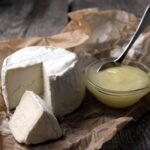No, dogs should not eat blue cheese, since it contains a substance called roquefortine C. This substance can bring on a range of health problems in dogs including high fever, diarrhea, and in severe cases, seizures1. These symptoms are likely to occur if your dog eats a large amount of blue cheese.

Caution: This food is generally considered risky by the veterinary community. Dogs should not eat this food and should be monitored for adverse effects.
| Food Safety | A small amount can be fine, however, the risk of getting sick in a dog remains. |
|---|---|
| Nutritional Issues | The fungus in blue cheese produces roquefortine C. It can lead to multiple health issues in dogs. |
| Potential Risks | In severe cases, eating too much blue cheese can cause seizures, which is harmful to a dog’s development. Its high fat content can also cause dogs to develop obesity. |
| Symptoms | Vomiting, diarrhea, seizures, lethargy, excessive panting, irregular heartbeat. |
How Much Blue Cheese Is Bad for Dogs?
While dogs can be fine if they eat a few crumbs of blue cheese, eating an entire piece of blue cheese can become dangerous. We suggest sticking to milder cheeses like mozzarella or cheddar if your dog is a fan of cheese. The potential risks are not worth giving your dog blue cheese.
What Makes Blue Cheese Unsafe?
Cheese in general is an unsafe food option for dogs since many dogs are lactose intolerant2. Apart from that, the high sodium and fat content in cheese can lead dogs to obesity. Blue cheese is an especially unsafe food for dogs since its fungus produces roquefortine C. This substance can lead to multiple health problems in dogs.
Signs Your Dog Ate Too Much Blue Cheese?
If your dog has eaten too much blue cheese, it will likely exhibit these symptoms:
- Vomiting
- Diarrhea
- Irregular heartbeat
- Lethargy
- Weakness
- Seizures
What To Do If Your Dog Is Sick from Too Much Blue Cheese?
If your dog is showing any of the symptoms above, immediately consult your vet for treatment.
Citations
Frequently Asked Questions
-
Many types of cheese are safe for dogs. However, they can cause health issues if your dogs are lactose intolerant.
-
If your dog ate a few small bites of blue cheese, keep a close eye on any symptoms. Consult your vet as soon as any symptoms associated with roquefortine C emerge.







